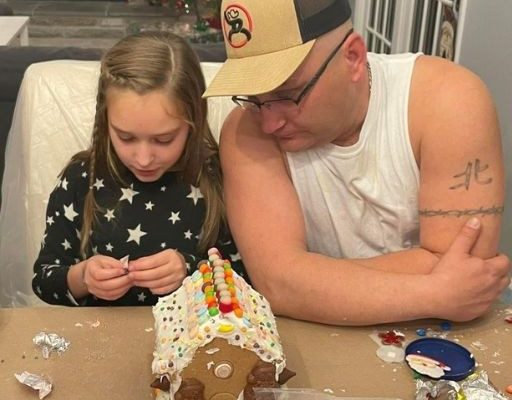The kitchen was a mess—peppermint wrappers scattered across the counters, Christmas music on loop, her laughter spilling into every corner.
She sat cross-legged on a chair, sorting gumdrops and peppermints into neat little piles as though it were the most important job in the world. At one point she held up a gummy bear and asked, with absolute seriousness, “Do you think this one looks like Santa’s dog?”
I just watched her, memorizing every detail—the way her hair fell across her face, the way her small hands pressed candy into icing. Because I knew something she didn’t.
That very afternoon, the custody ruling had arrived. I hadn’t told her. I couldn’t.
All she knew was that this was “Daddy’s gingerbread night.” No court dates, no lawyers, no heartbreak. Just gumdrops, sliding rooftops, and her little voice humming along to Jingle Bell Rock.
At one point she pressed a piece of candy into my hand and whispered, “Let’s hide this one in the back, so nobody steals it.”
My chest tightened. Because starting tomorrow, I wouldn’t be there to protect her gumdrops—or to check under her bed for monsters, or to make warm milk when she couldn’t sleep. Still, I forced a smile and told her, “Good idea. That way it’s safe.”
We worked in silence for a while, giggling when the roof slipped. She braced it with one hand while I held it steady with the other. “Don’t let go, Daddy,” she warned.
“I won’t,” I promised, knowing full well that soon, I’d have no choice.
She kept chattering about her school play—how she’d be the third reindeer and had to practice stomping her feet in rhythm. She made me do it with her, socks sliding on the tile, the half-finished gingerbread house forgotten for a moment.
But when my phone buzzed with her mom’s name, reality crashed back in. I flipped it over before she noticed, murmuring, “Nothing, sweetheart.” She frowned but went back to her candy canes, merciful in the way only children can be.
We finished the house—it leaned to one side, the roof sagged, a gummy bear slid down the wall like he’d given up. She declared it perfect. “Can we keep it forever?” she asked, her eyes shining.
I nodded, forcing the words out. “Forever and ever.”
That night, after tucking her in, she asked me to stay. “I want to tell you a secret,” she whispered. “I wish it could always be Christmas.”
I swallowed hard. “Me too.”
I sat in the dark afterward, staring at the glow-in-the-dark stars on her ceiling, wishing time could freeze.
The next morning, I packed her things while she slept—her favorite blanket, her dinosaur toothbrush, the drawing she made of the gingerbread house. She woke as I zipped the bag.
“Are we going somewhere?” she mumbled.
“You’re going to Mom’s today,” I said quietly.
“But I’ll come back tomorrow, right?”
I hesitated too long. She knew. Her little face crumpled, and she threw her arms around me, whispering, “I don’t want to go.”
I held her tight, whispering promises I wasn’t sure I could keep.
When her mom arrived, the house fell into silence. No fights this time. Just the sound of her crying into my chest until I finally had to let go.
The door closed, and the house felt emptier than I thought possible. The gingerbread house still sat on the counter, collapsing slowly. For weeks, I couldn’t touch it. It became a monument to the last night we’d lived under the same roof.
I fought in court again. Filed paperwork. Hired new lawyers. But the system doesn’t care about candy houses and bedtime secrets. I still got weekends, but it wasn’t the same.
Then, one Saturday, she walked in carrying a box.
“What’s that?” I asked.
“Our gingerbread house,” she said proudly. “Mom helped me fix it. She said it belongs with both of us.”
I stared at it—patched with new candy, leaning even more than before, but still standing. For the first time, I realized her mom wasn’t the villain I’d made her out to be. Maybe she was just another parent who loved her as fiercely as I did.
It didn’t fix everything—there were still battles, disappointments, long nights of missing her—but something shifted that day.
The gingerbread house became our tradition. Every Christmas, we built a new one. Sometimes at my place, sometimes at hers, sometimes together. The houses lined up like a timeline of crooked, sticky monuments to love that refused to disappear.
When she turned twelve, she laughed at the first one. “You really let me think this was good?”
“It was perfect,” I told her. And it was. Because it had been our last night before everything changed.
Looking back, I see now that I didn’t lose her that night. I only lost the picture in my head of what I thought family had to look like. Love doesn’t vanish when the roof slides or the walls crack—it just shifts, adapts, finds new ways to hold.
That gingerbread house taught me that. Even broken things can still stand if you keep patching them with enough care.
So if you feel like something precious is slipping away, remember this: what matters isn’t perfection. What matters is keeping it standing.
And every Christmas since, we’ve done just that.
Love changes shape, but it doesn’t have to disappear.



